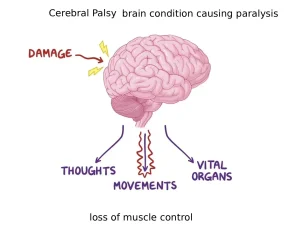Overview
Diagnosis
Symptoms of cerebral palsy often become more noticeable over time. Diagnosis may not occur until a few months or even a year after birth, and if symptoms are mild, it can take longer.
If cerebral palsy is suspected, a healthcare professional will carefully evaluate your child’s symptoms, review their medical history, perform a physical examination, and monitor growth and developmental milestones.
In some cases, your child may be referred to specialists who focus on brain and nervous system disorders in children. These may include pediatric neurologists, pediatric rehabilitation specialists, and child development experts.
To confirm the diagnosis and rule out other possible causes, several tests may be recommended.
Brain Scans
Brain imaging tests can help identify areas of brain damage or abnormal development. Common imaging tests include:
-
MRI: Magnetic resonance imaging uses radio waves and a magnetic field to produce detailed images of the brain. It can identify subtle changes in brain structure. The test is painless but may require light sedation to help the child stay still.
-
Cranial ultrasound: Often performed in infancy, this test uses sound waves to create images of the brain. While not as detailed as an MRI, it is quick and useful for an initial assessment.
Electroencephalogram (EEG)
If seizures are suspected, an EEG may be performed to measure the brain’s electrical activity. Small electrodes are attached to the scalp to record brain wave patterns. This test helps diagnose epilepsy, which can occur alongside cerebral palsy.
Laboratory Tests
Blood, urine, or skin samples may be tested to detect genetic or metabolic disorders that could contribute to symptoms similar to cerebral palsy.
Additional Tests
After confirming cerebral palsy, additional assessments may be done to evaluate associated conditions. These may include tests for:
-
Vision
-
Hearing
-
Speech
-
Intellectual ability
-
Developmental milestones
-
Movement patterns
-
Other medical conditions
The type of cerebral palsy is determined based on the main movement disorder, though multiple types may overlap.
-
Spastic cerebral palsy: Characterized by stiff muscles and exaggerated reflexes.
-
Dyskinetic cerebral palsy: Involves difficulty controlling voluntary movements.
-
Ataxic cerebral palsy: Affects balance and coordination.
After diagnosis, healthcare professionals may use a scale such as the Gross Motor Function Classification System to measure mobility, posture, and balance, helping to plan effective treatment strategies.
Treatment
Cerebral palsy requires long-term care managed by a multidisciplinary team. Your child’s care may be led by a pediatrician, physical medicine specialist, or neurologist, supported by therapists and mental health professionals. The goal is to improve daily function, independence, and quality of life.
Although there is no cure for cerebral palsy, early and ongoing treatment can help manage symptoms effectively. Treatment options may include medications, various forms of therapy, surgical interventions, and other supportive measures.
Medications
Medications can help relax tight muscles, manage pain, and reduce complications associated with spasticity.
-
Muscle or nerve injections: OnabotulinumtoxinA (Botox) or similar agents may be injected into specific muscles to reduce stiffness. Injections are typically repeated every few months.
-
Oral muscle relaxants: Medications such as baclofen, tizanidine, diazepam, or dantrolene are used to relax muscles and improve mobility. In some cases, baclofen may be delivered through a pump implanted under the skin.
-
Medicines to reduce drooling: Botox injections into salivary glands can help manage excessive saliva.
Your healthcare provider will discuss the potential benefits and side effects of each medication.
Therapies
Therapies form the foundation of cerebral palsy treatment and play a vital role in improving physical, cognitive, and emotional well-being.
-
Physical therapy: Exercises and muscle training help strengthen muscles, improve flexibility, balance, and motor coordination. Therapists also teach safe ways to perform daily activities at home.
-
Occupational therapy: Helps children develop independence in daily routines such as dressing, feeding, and writing. Adaptive equipment such as walkers, canes, or wheelchairs may also be recommended.
-
Speech and language therapy: Aims to improve speech clarity, communication, and swallowing abilities. Communication devices may be introduced if needed.
-
Recreational therapy: Activities such as adaptive sports, horseback riding, or swimming can improve physical fitness, coordination, and emotional health.
Surgical Procedures
Surgery may be recommended to reduce muscle tightness, correct bone abnormalities, or improve mobility.
-
Orthopedic surgery: Corrects bone and joint deformities caused by muscle contractures. Surgery may reposition tendons, lengthen muscles, or realign joints to reduce pain and improve movement.
-
Selective dorsal rhizotomy: Involves cutting specific nerve fibers that cause severe muscle stiffness in the legs. This can ease pain and improve movement but may cause numbness in treated areas.
Other Treatments
Additional treatments may address complications such as seizures, pain, osteoporosis, mental health conditions, and sleep disturbances. Support may also be needed for feeding, oral care, bladder control, and sensory impairments.
Adults with Cerebral Palsy
As children with cerebral palsy grow into adulthood, their healthcare needs evolve. Adults may face additional challenges such as fatigue, pain, dental issues, arthritis, heart and lung conditions, and mental health concerns. Regular checkups help manage these issues and maintain overall health.
Alternative Medicine
Some families explore complementary or alternative therapies for cerebral palsy. These treatments have not been scientifically proven or widely adopted in standard care. It is important to consult your healthcare provider before starting any alternative therapy to ensure safety and avoid interference with medical treatment.
Advertisement

